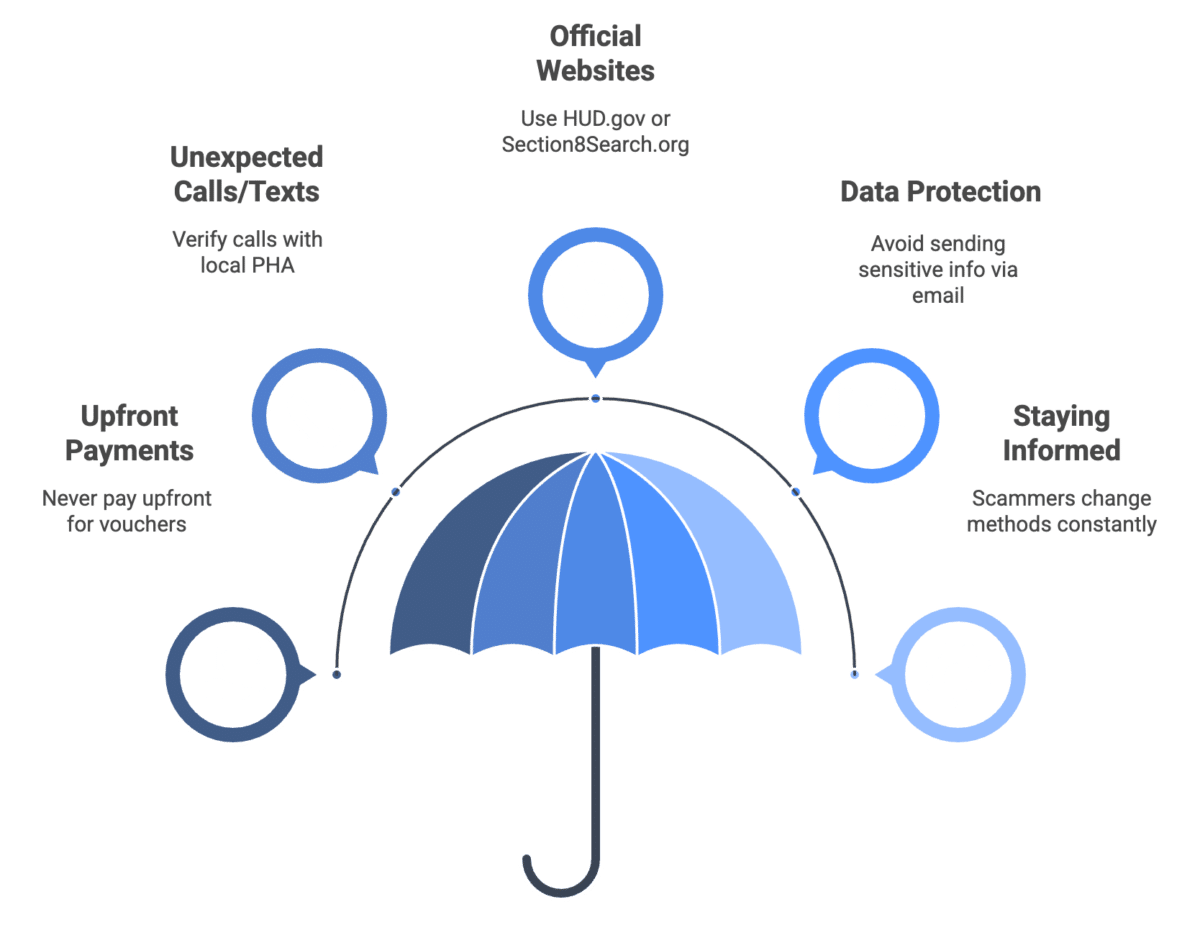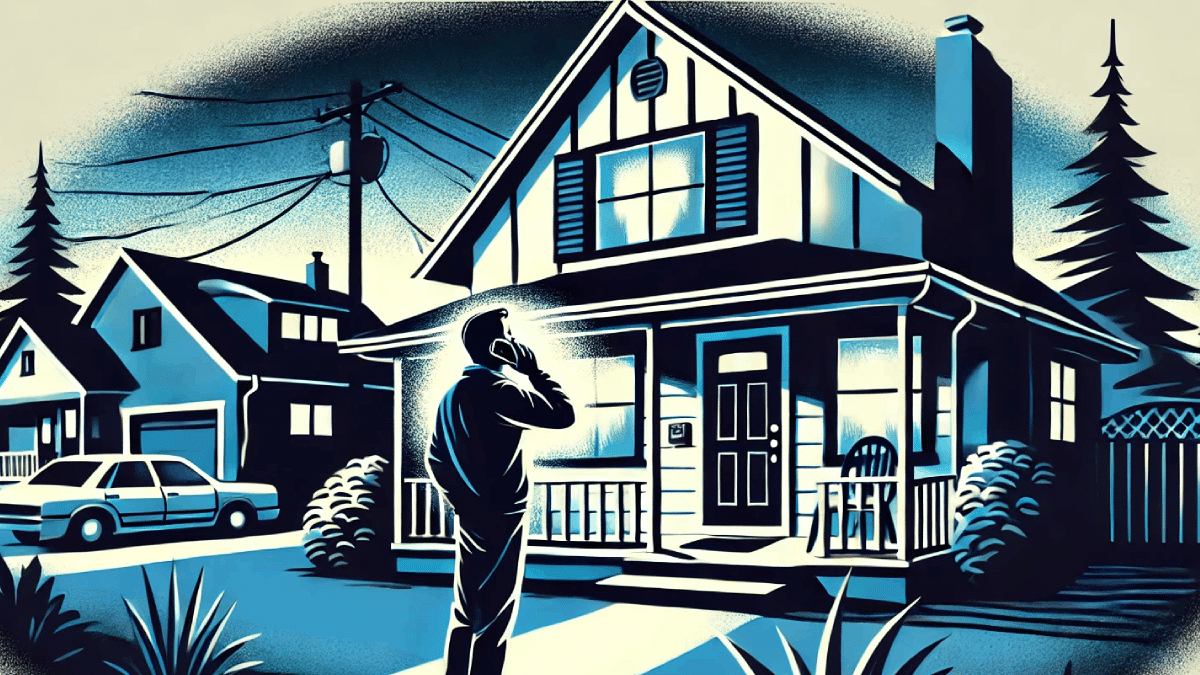
Evaluation of the PHA CARES Waivers: Final Comprehensive Report
April 18, 2025
Housing News: April 2025
April 30, 2025Have you recently received a phone call or text message offering free rent through the Housing Choice Voucher (HCV) program? If so, beware: it’s likely a scam.
Scammers are now using new tactics to trick vulnerable renters into sharing personal information or sending money upfront. One of the most dangerous versions of this scam involves fake promises of rent-free housing through Section 8.
In this article, we’ll explain how this scam works, how to protect yourself and your family, and what to do if you’ve already been targeted. We’ll also show you where to find legitimate Section 8 housing and share trusted resources to help you recover and stay safe in the future.
“The scammers had my full name and knew I had applied to a housing list before. I really thought it was a follow-up”Paul M.
Victim of a scam.
What Is the “Free Rent” HCV Phone Scam?
Scammers are calling or texting people pretending to be from the U.S. Department of Housing and Urban Development (HUD) or a local Public Housing Agency (PHA). They claim you’ve been approved for a Housing Choice Voucher and can get free rent if you follow a few steps.
But here’s the catch—they’ll ask you to:
- Pay an application fee or processing fee
- Give them your Social Security number, bank info, or personal details
- Visit a fake website that looks like a government page
- Share a code sent to your phone, which lets them steal your identity
These are all red flags. The real Section 8 program does not ask for money upfront, and no one will call or text you out of the blue with a voucher offer.
Learn how scammers are also using AI-generated listings and fake social media ads in this guide.
Why This Scam Works
Scammers know people are struggling. With inflation rising and rent prices going up, the promise of free housing sounds like a dream. Many families are on long waiting lists or have applied to multiple voucher programs with no response—so when a “HUD agent” calls, they want to believe it’s real.
But that’s how they get you. Scammers target hope. And they know just enough about the real HCV program to sound convincing.
Sound familiar? You’re not alone. Learn more about what to do if you got scammed on your Section 8.
How the Scam Call Typically Goes
Here’s a typical script scammers might use:
“Hello! This is Mark from your local housing office. You’ve been selected for a new rent assistance program under the Housing Choice Voucher system. You qualify for 100% rent coverage for up to 12 months. We just need a $50 processing fee to confirm your voucher and get you started today.”
Or:
“Hi! This is a courtesy call from HUD. We’re giving away free housing vouchers to people affected by the rising cost of living. Please visit HUD-freevoucher.org to activate your code and claim your free rent offer.”
Let’s be clear: there is no HUD-freevoucher.org, and real PHAs do not give out free rent or charge upfront fees. Visit the official HUD site to check if any phone number or website is real.
How to Know If It’s a Scam
Use this quick checklist:
| Safe | Scam |
|---|---|
| Application is done through PHA’s official site | Random call or text with a “special offer” |
| You’re asked for ID and income info after applying on a verified platform | You’re asked to pay a fee or wire money upfront |
| You confirm info in person or through secure portals | You’re pressured to act “right now” or “within 24 hours” |
| You apply for a waitlist or are contacted after an official opening | You get a surprise call saying you’ve “won” or been “pre-selected” |
| You’re guided to section8search.org or your local PHA website | You’re directed to a suspicious domain or sketchy app |
Still unsure? Check out this helpful guide on how to avoid rental scams on social media.
Real People, Real Losses
Scam victims have lost hundreds or even thousands of dollars thinking they were about to move into a new home.
Some common ways people lose money:
- Paying an “application fee” to a fake site
- Sending money via Zelle, Venmo, or gift cards
- Giving bank details for “automatic rent processing”
- Clicking links that install spyware on their phones
Once scammers get what they want, they disappear. And the fake housing offer? Never existed.
What To Do If You Got a Scam Call
If someone tried to scam you or already did, don’t panic. You’re not alone and there are steps you can take.
1. Report the Scam
Report it to:
- FTC
- HUD Office of Inspector General
- Your local housing agency (see list here)
- Section 8 Shield Scam Report Tool
2. Protect Your Identity
If you gave out personal info:
- Visit IdentityTheft.gov
- Freeze your credit at Equifax, Experian, and TransUnion
- Monitor your accounts for unusual activity
3. Connect With Real Housing Help
Use only verified platforms:
- HUD.gov
- Section8Search.org – browse safe listings
- PHA Contact Directory
How to Avoid Future Scams

Read our guides like:
There Are Still Safe Options
If you fell for the scam, don’t give up on your housing journey. Many people have been in your shoes and recovered.
The most important thing is to stay informed, stay calm, and keep going. There are real programs out there that can help.
You can:
- Apply to legitimate Section 8 waiting lists
- Search verified housing at Section8Search.org
- Contact your local housing office for updates on available programs
Check out our article on second chances after a scam for tips on how to move forward with confidence.
Final Takeaways
Scams like this one hurt people who are just trying to survive. That’s why spreading awareness matters. You can help others by:
- Sharing this article with friends or family
- Reporting new scam calls to the FTC and HUD
- Bookmarking Section8Shield.com and Section8Search.org
Together, we can stop scammers in their tracks.




